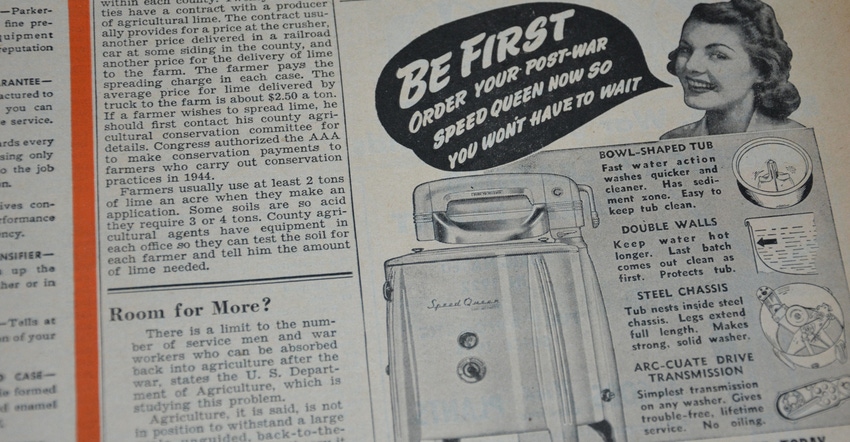May 8, 2019

By June or 1944, there was anticipation of the end of World War II and what the post-war economy might bring, including reintegrating veterans into the civilian workforce, rescaling on-farm production and ordering new goods that would be available as manufacturing for the war effort began to end.
Among the anticipated items: a new washing machine for the household. Speed Queen was urging consumers to put in an order for a new gas or electric washing machine in anticipation of getting it delivered quickly once the war ended.
Prospective customers were urged to contact their dealer and sign up in the dealer’s “Victory Order Book” to get in line for a new machine.
55 Years Ago
Kansas State University officially became a center for training and research in cereal technology with the dedication of its new bakery management course.
Dr. John A. Shellenberger, head of the K-State department of flour and feed milling industries, termed the teaching and research facilities a “Cereal Complex,” pointing out that the university offered a full range of wheat services to the industry, starting with wheat breeding programs for better varieties.
45 Years Ago
Farmland prices were spiraling upward in June of 1974, with two of Kansas’ most notable farmland analysts seeing a 30% to 35% jump in prices for the 12-month period that ended in March.
Kansas was not alone in seeing the jump in farmland values.
Nationwide, the average cost of an acre of farmland shot up 21% in the year that ended in November of 1973.
35 Years Ago
Kansas irrigators were looking for the best places to invest their money to prepare for the future, and at least one producer, Randal Loder of Finney County, believed that on-farm storage for wheat and milo was the best investment bet.
Loder said that, with the cost of irrigation steadily increasing, he needed to be able to store wheat to market it at the right time to local stockyards. He said the feedyards were offering a 20-cent to 40-cent-per-bushel premium over prices at the local elevator.
20 Years Ago
Kansas State University wheat breeder Rollie Sears left K-State after 20 years to take a position with Agri-Pro Seeds in June of 1999. Developing improved wheat varieties continued as the focus of his work, with Shawnee Mission-based Agri-Pro planning a wheat research and wheat quality facility in Manhattan.
Goerzen is Executive Director of Old Cowtown Museum in Wichita.
About the Author(s)
You May Also Like




